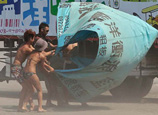
Cultural details such as hanging argyi at the door or jumping over Zhongkui are hard to be kept today, but some healthy lifestyles like reading poems, dragon boat competing, having outdoors picnics and activities can be recreated. Some changes have been made in some places, but what they have done is far from enough.
For instance, the core spirit for the Dragon Boat Festival comes from Qu Yuan. His concerns for the country have already become the foundation and collective identity for Chinese people. This can be another cultural element in the festival.
Many experiences can be borrowed from Japan or South Korea in reviving the traditional culture. For example, except for those rituals, the famous "Gangneung Danoje Festival" in South Korea also contains many interesting activities like masquerade, folk dancing, and many games such as wrestling, swing playing, tug-of-war and archery. Millions of tourists visit Gangneung this time every year.
Japan has also added some new elements to the Dragon Boat Festival. After the World War II, Japan made the Dragon Boat Festival "the Boys' Festival". Many families will hang carp streamers at the door, because Japanese people believe that the carp streamers symbolize strength and courage.
Passing on the traditional cultures and penetrating them into peoples' hearts are not unsolvable issues. We need more detailed contents, more creations with cultural elements and more praise of spiritual value. Only in this way, we can be less materialized through little cultural contribution towards our traditional festivals.
Source: The Beijing News

















 China's Chongqing issues orange-coded alert of heat
China's Chongqing issues orange-coded alert of heat


![]()
